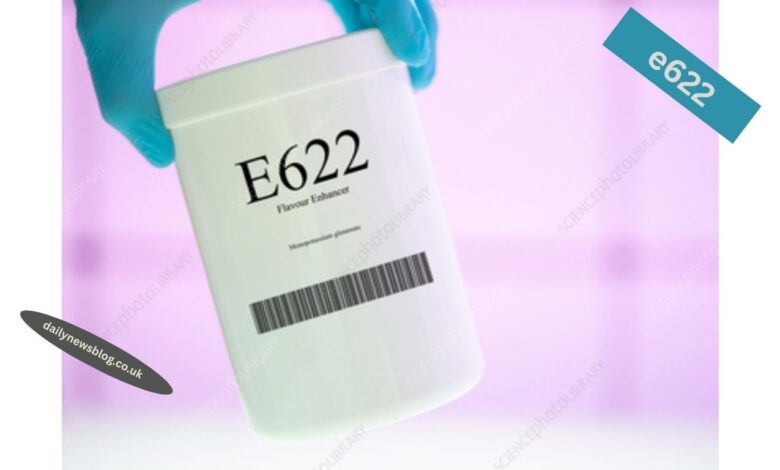Is E622 Harming Your Body? The Shocking Truth Revealed

Introduction
E622 is a widely recognized food additive, often lurking in the ingredients list of many processed foods you consume daily. Also known as monosodium glutamate (MSG), E622 enhances the savory or umami flavor in foods, making them taste richer and more satisfying. Despite its widespread use, E622 has sparked considerable debate over its safety and potential health effects. This article aims to demystify E622 by explaining what it is, how it’s used, whether it is safe, and addressing common questions that consumers often have.
What Is E622?
E622 is the European Union’s food additive code for monosodium glutamate, a sodium salt of the naturally occurring amino acid glutamic acid. This compound is key to creating the umami flavor, which is sometimes described as the fifth basic taste alongside sweet, sour, salty, and bitter. While glutamic acid is naturally present in many foods like tomatoes, cheese, and mushrooms, E622 is added industrially to processed foods to intensify their taste profile without adding extra calories, fat, or salt.
The presence of E622 in food allows manufacturers to create more flavorful products while reducing sodium content, which is important for consumers watching their salt intake. Its ability to enhance taste has made it a staple in seasoning blends, canned soups, snack foods, and frozen meals.
What Is the Code E622?
Food additive codes, like E622, are used primarily in Europe to help consumers identify substances added to foods for various purposes. E622 specifically designates monosodium glutamate, ensuring transparency on ingredient labels. Knowing this code can help consumers recognize when MSG is present, especially if they are trying to avoid it due to personal preference or sensitivity.
How Is E622 Used in Food?
E622 is widely used in both commercial and home cooking for its remarkable flavor-enhancing properties. It is particularly prevalent in Asian cuisine, where the umami taste is highly valued. You’ll find E622 in a vast range of products such as seasoning powders, instant noodles, processed meats, canned vegetables, sauces, and fast food items.
By activating specific taste receptors on the tongue, E622 heightens the savory and meaty notes of food, making meals taste more robust and satisfying. This additive allows food producers to deliver consistent flavor experiences, which is crucial in the mass production of packaged foods.
Is E622 Halal or Haram?
For consumers following halal dietary laws, it’s essential to know whether E622 is permissible. Since E622 is chemically produced and contains no animal-derived ingredients, it is generally regarded as halal. However, consumers should always check the entire product’s certification because other ingredients or cross-contamination could affect the halal status of a food item.
What Is Potassium Glutamate in Food?
Potassium glutamate is a related compound to monosodium glutamate, functioning similarly as a flavor enhancer. It differs by having potassium instead of sodium, making it a popular choice for people seeking to lower sodium intake while still enjoying enhanced food flavors. Like E622, potassium glutamate is used in a variety of processed foods to boost the umami taste.
Is E621 Halal?
E621 is another additive code used for monosodium glutamate, particularly in some countries outside the EU. The halal status of E621 is essentially the same as E622 because both represent the same chemical compound—MSG. Thus, E621 is also considered halal when produced without animal ingredients.
Is E622 Harming Your Body? The Shocking Truth Revealed
The safety of E622 has been scrutinized for decades, with many people fearing adverse effects. Some individuals report headaches, flushing, sweating, or nausea after consuming high amounts of MSG, a condition sometimes called “Chinese Restaurant Syndrome” or “MSG symptom complex.” However, numerous scientific studies have failed to find consistent evidence that E622 causes these symptoms in the general population.
Organizations such as the U.S. Food and Drug Administration (FDA) and the European Food Safety Authority (EFSA) have classified E622 as generally recognized as safe (GRAS). While some people may be sensitive to MSG, for most consumers, E622 poses no health risks when eaten in typical food amounts.
Natural vs. Synthetic E622
E622 can be derived naturally or produced synthetically. Natural sources of glutamate include fermented products like soy sauce and aged cheese. Synthetic E622 is manufactured through bacterial fermentation or chemical processes, resulting in the same flavor-enhancing compound. Both forms are considered equivalent in flavor and safety, though some consumers prefer natural sources due to perceived health benefits or personal beliefs.
How to Identify E622 on Food Labels
E622 might appear on food labels as monosodium glutamate, MSG, or simply as E622. It is essential for consumers who wish to avoid this additive to look for these terms carefully. Awareness of labeling conventions can help shoppers make informed decisions, particularly for those with sensitivities or dietary restrictions.
Alternatives to E622 in Cooking and the Food Industry
With growing consumer demand for clean-label products, manufacturers are exploring natural alternatives to E622. Ingredients like mushroom extracts, seaweed powders, yeast extracts, and tomato powders are gaining popularity as natural umami enhancers. These substitutes can provide similar flavor benefits without the use of synthetic additives, catering to health-conscious consumers and those seeking more natural ingredients.
Frequently Asked Questions (FAQ)
What is E622 in food?
E622 is monosodium glutamate (MSG), a flavor enhancer added to many processed foods to boost their savory taste.
What is the code E622?
E622 is the European food additive code for monosodium glutamate.
What is potassium glutamate in food?
Potassium glutamate is a flavor enhancer similar to E622 but uses potassium instead of sodium, often as a lower-sodium option.
Is E622 halal or haram?
E622 is generally considered halal because it is a chemically synthesized additive with no animal-derived ingredients.
Is E621 halal?
E621 is another code for monosodium glutamate and shares the same halal status as E622.
What is the message code?
“Message code” often refers to additive codes like E621 or E622, which identify monosodium glutamate used as flavor enhancers.
Conclusion
E622 is a commonly used food additive that enhances the savory taste of many processed foods. While some concerns about its health effects exist, the bulk of scientific evidence supports that E622 is safe for most people when consumed in moderation. Those with specific sensitivities may want to limit their intake, but for the general population, E622 remains a useful and safe flavor enhancer. Understanding E622, recognizing it on labels, and knowing its effects can empower you to make better food choices.
SEE MORE ARTICLES Dailynewsblog




